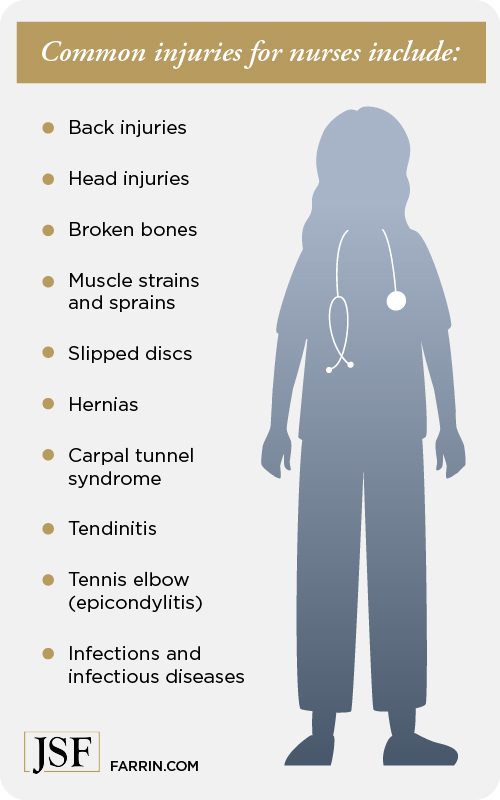Healthcare is one of the most dangerous professions in the U.S. More workers are injured in the healthcare industry than any other, according to the Occupational Safety and Health Administration (OSHA).
In North Carolina, the healthcare industry supports more than 515,000 jobs and has an economic impact of $40 billion, according to the North Carolina Healthcare Association. In South Carolina, the healthcare industry provides more than 70,000 jobs and has an economic impact of more than $28 billion, according to the South Carolina Healthcare Association.
If you’re in the healthcare industry and you suffer a work-related injury, you may be entitled to workers’ compensation for your injuries. In this article, I’ll discuss some of the most common injuries healthcare professionals face in North and South Carolina and what steps to take if you’ve been injured at your healthcare job. I’ll also talk about some of the ways an insurance company may try to reduce the value of your claim, and how you can fight back with the help of an attorney.
What Healthcare Profession Is Most Injured on the Job?
According to OSHA, nursing assistants by and large have the highest rate of musculoskeletal disorders (MSDs) of all occupations. MSDs are conditions that affect the neck, back, shoulders, elbows, hands, or wrists. Nursing assistants are at high risk of developing MSDs because nursing assistants often face physically challenging motions that can lead to injury, such as:
- Turning, moving, or lifting patients who may be much heavier than the nursing assistant
- Bathing patients
- Transporting patients
- Slipping on wet or slick surfaces
- Being attacked by uncooperative patients or those with a history of violent behavior. Healthcare settings such as nursing homes and hospitals may also be the targeted by those looking for prescription drugs.
- Overexertion from
- repetitive movements
- long hours
- and understaffed working conditions
The National Institutes of Health (NIH) reports that more than a quarter of nurses work more than 12 hours per shift, and more than a third work six or more days in a row.
What Are Common Injuries for Nurses?
According to the CDC, nursing assistants are the most likely among all healthcare personnel to experience traumatic injuries, particularly musculoskeletal disorders (MSDs) such as:
- Back injuries
- Head injuries
- Broken bones
- Muscle strains and sprains
- Slipped discs
- Hernias
- Carpal tunnel syndrome
- Tendinitis
- Tennis elbow (epicondylitis)
- Infections and infectious diseases
The most common injuries in healthcare workers are back injuries, followed by other MSDs. More than one-third of back injuries among healthcare workers are associated with moving and handling patients, either as a one time event or as a result of repetitive, taxing motion. Back injuries cost the healthcare industry more than $7 billion annually.
Filing Workers’ Comp Claims for Healthcare Injuries: What Qualifies?
For back injuries in North Carolina, there needs to be a specific incident that directly causes the injury for you to be able to make a claim, but it doesn’t have to be an accident. If your back injury arises because you are engaging in a daily task, for example, you could still bring a claim.
For an injury to a body part other than the back to be covered, there must be some type of accident or unanticipated event. This could be something as simple as exerting an unusual amount of effort on a particular occasion.
While South Carolina still requires that you suffer an injury by accident to bring a claim, the term “accident” is defined differently. As a result, you don’t necessarily need anything out of the ordinary to bring a claim if you are injured in the course and scope of your employment. This applies not only to back claims, but injuries to any part of the body.
An example of a healthcare worker getting injured by an unanticipated event is a paramedic rolling a stretcher across a cobblestone driveway when they trip and become injured. As most driveways aren’t made of cobblestone, this injury likely qualifies for a workers’ comp claim.
Physical Attacks on Healthcare Workers
Besides the potential danger of getting injured due to accidents, nursing assistants may sometimes work with patients who are physically dangerous and cause them injury. For example, I had a client who was a nurse in a psych ward. One of the patients became combative and attacked them, causing them injury. I’ve also had other clients who got punched in the face by uncooperative patients.
Getting injured as result of being physically attacked or assaulted would be another instance in which you could file a workers’ comp claim. Working in healthcare is dangerous, but that’s why workers’ compensation exists – to help protect workers in dangerous jobs.
The Workers’ Comp Process for Injured Healthcare Professionals
If you’re a nursing assistant or healthcare worker who has suffered an injury while performing your duties, you may be entitled to compensation through a workers’ compensation claim.
If you’ve been hurt on the job, here are 3 critical steps to take:
-
- Seek medical care and notify your employer
Once you’ve been injured, you should seek medical care immediately, and then notify your supervisor as soon as possible to begin the workers’ compensation claims process.
-
- File your application and be contacted by the adjuster
If you speak to the insurance company’s adjuster, they may seem friendly or helpful, but beware: Some may deliberately take things you say out of context and use them against you to try to reduce the value of your claim – or deny it completely.
-
- Negotiation
Once you’ve healed as much as possible, you and your attorney can seek maximum compensation. The insurance company is likely to push back. They may respond with a lowball counteroffer but your attorney can use leverage, including taking your case to trial if needed, to negotiate on your behalf. If we’re unable to agree with the insurance company, a mediator will likely be assigned to try to facilitate an agreement.
An experienced workers’ compensation attorney can significantly increase your odd of success by helping protect your interests and your rights throughout the workers’ compensation process.
How a Workers’ Comp Attorney Can Help
An experienced workers’ compensation attorney can help you with your workers’ compensation claim in many ways, including:
- Organizing, submitting, and managing your claim.
The workers’ comp process can be confusing. An experienced workers’ comp attorney will help you submit your claim properly and ensure that no deadlines are missed.
- Dealing with the workers’ compensation insurance company so you don’t need to.
Some insurance companies may try to take advantage of injured workers. They understand the workers’ comp process because they deal with it every day, but your lawyer will deal with them for you so you can focus on getting better.
- Fight for the full compensation you may deserve.
Your workers’ comp lawyer will use their knowledge and experience to fight for the maximum compensation you may deserve for your injuries.
Our attorneys work on a contingency fee basis, meaning if we don’t recover compensation for you, you pay no attorney’s fee at all. Guaranteed.2
Why Choose James Scott Farrin for Your Workers’ Comp Claim?
The workers’ compensation team at James Scott Farrin features several attorneys with other-side experience from working for insurance defense firms. Now, they use that inside knowledge to fight for injured workers.
We were also recently named to Best Lawyers’ 2024 list of “Best Law Firms,” with the highest ranking possible in the category of Workers’ Comp – Claimants.3
If you’re a healthcare professional or any type of worker who has been injured on the job, reach out for a free case evaluation. Find out what your case may really be worth. Call us today at 1-866-900-7078 or submit your online form.







